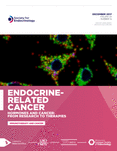Mammary developmental fate and breast cancer risk
- (Requests for offprints should be addressed to D Medina; dmedina{at}bcm.tmc.edu)
Abstract
The ovarian hormones, estrogen and progesterone, play a pivotal role in normal and neoplastic development of the mammary gland. These hormones have a paradoxical role as long duration of estrogen and progesterone are associated with increased breast cancer risk, while short duration of pregnancy level doses are associated with a reduced breast cancer risk. The protective effects of estrogen and progesterone, as well as pregnancy, have been extensively studied in animal models. Recent studies have demonstrated that these hormones induce alterations in gene expression in the mammary epithelial cells which persist for a long time after the hormones are withdrawn from the host. It is postulated that hormones induce a switch in mammary developmental fate which decreases the risk of breast cancer over the lifetime of the host. Some of the possible cellular pathways persistently altered by short term hormone exposure are a decrease in growth factors and an increase in apoptosis. The expression of these genes, in turn, may be affected by alterations in genes regulating chromatin remodeling. The relative contributions of host-mediated factors and mammary cell intrinsic factors remain to be determined. The current studies have moved this research area from the biological to the molecular realm and offer the potential for directing prevention efforts at specific molecular targets.
- © 2005 Society for Endocrinology












